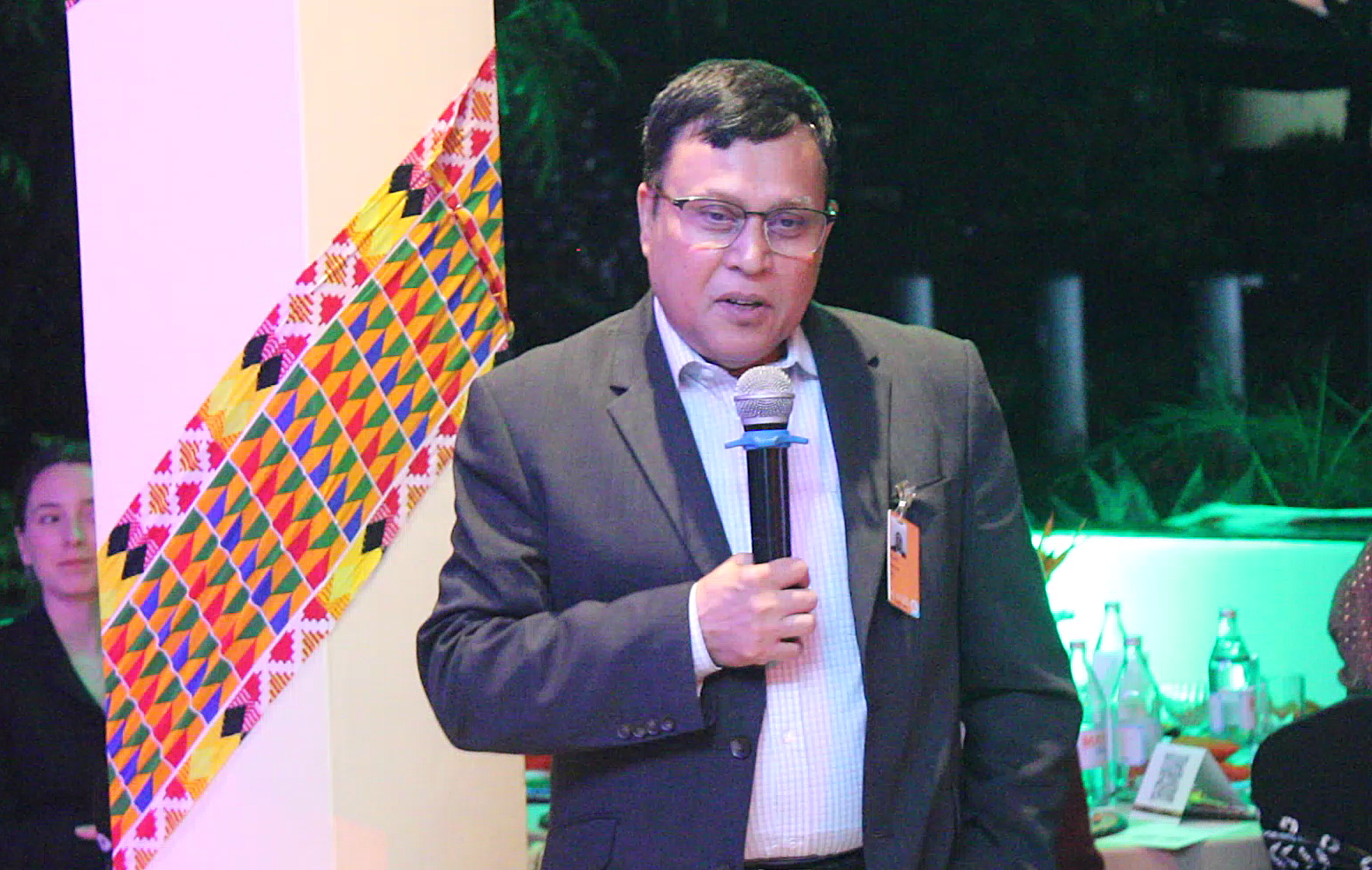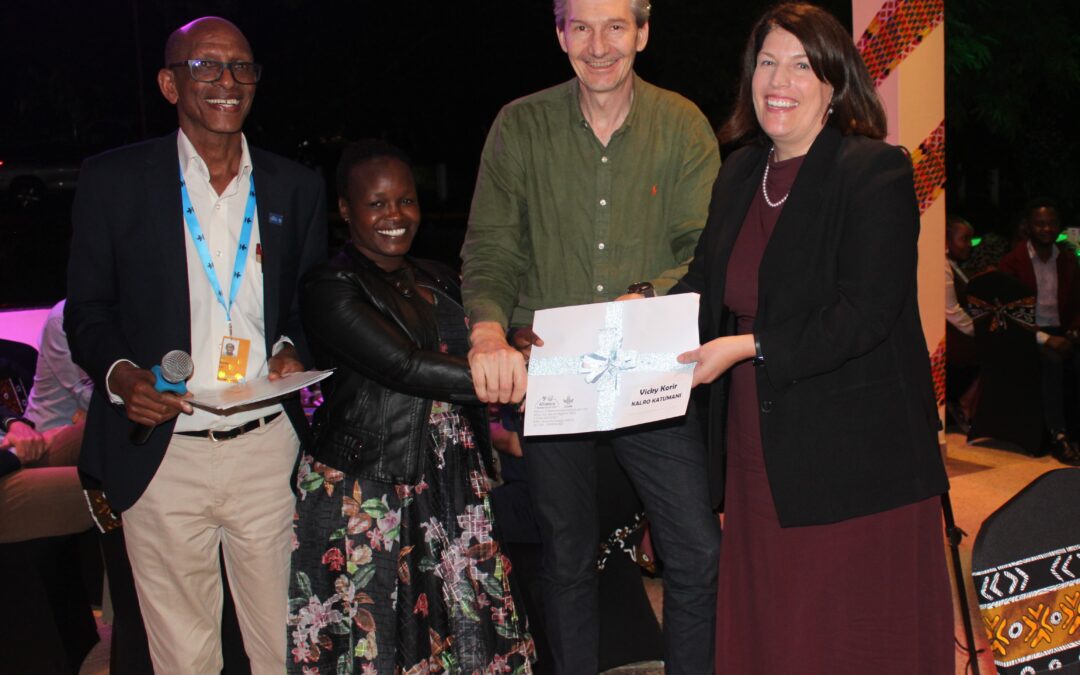By Yohane Chideya, Justin Mabeya Machini, and Jean Claude Rubyogo
Silence. Anticipation. Excitement. Then—applause. Cheers break out. Such was the electric mood at the Biodiversity Bites Dinner in Nairobi, Kenya on 8th April 2025, when Jean Claude Rubyogo—Global Bean Programme Leader at the Alliance of Bioversity and CIAT, and Director of the Pan-Africa Bean Research Alliance (PABRA-Africa)—stepped forward to make a landmark announcement. Grasping the moment, he unveiled the PABRA Academy, a bold and forward-looking capacity-building initiative designed to close critical gaps along the bean value chain and empower actors from field to fork.
“Our goal is to ensure it becomes deeply institutionalized—within countries, within the value chain—so that over the next 10 to 15 years, the growing private sector can actively support research, address challenges, and contribute meaningfully to our work. That is the kind of capacity we are putting in place,” Rubyogo announced with joy.
Designed to benefit all stakeholders across the bean value chain in PABRA’s 31 member countries, the Academy will use PABRA’s Capacity Building Framework aligned with the bean corridor approach—to equip crop improvement researchers and other actors with the knowledge, skills, and tools needed to develop, deliver, and promote bean varieties and technologies that meet market demands.
In its first round of support, the PABRA Academy is focusing on training researchers in the National Agricultural Research Systems (NARS) at Post-graduate levels of Masters and PhDs. So far, six initial beneficiaries have been selected, comprising three females and three males, selected from Democratic Republic of Congo, Ghana, Kenya, Tanzania, Zambia and Zimbabwe.
Vicky Korir, a Bean Research Scientist at the Kenya Agricultural and Livestock Research Organization (KALRO-Katumani), is in the first cohort of PABRA Academy Fellows. With four years of experience in the Grain Legumes Bean Program and currently pursuing a PhD in Plant Pathology at Maseno University, Kenya, Vicky is eager to embrace the journey ahead and the opportunities it brings.
Said Vicky, “Through the PABRA Academy Fellowship, I look forward to working closely with experts and peers in the field, gaining hands-on experience and building my training capacity. This opportunity will help me enhance and strengthen bean production, especially in rural areas. I’m also excited to collaborate with experts across the Alliance to align research with farmers’ needs and create meaningful impact.”
The Academy will help build a vibrant, skilled workforce for future generations. By operating through the bean corridor, the Academy bridges research and practice, creating a feedback loop that drives continuous improvement of technologies and practices. By linking academia with industry through research and mentorship, the program stays continuously relevant, impactful and sustainable.
Another beneficiary, Robert Lungu—an Agricultural Research Officer at the Zambia Agriculture Research Institute (ZARI), based at Misamfu Research Station and currently pursuing a Master of Science in Plant Breeding and Seed Systems at the University of Zambia—expressed great enthusiasm about the fellowship.
“This opportunity represents a significant milestone in my academic and professional journey. Being part of a network of passionate and hardworking scholars inspires me to aim higher and strengthen my commitment to conducting impactful research. I see this PABRA Academy fellowship not only as recognition of my potential, but also as fuel to expand my knowledge and sharpen my skills necessary to excel in bean breeding. It will undoubtedly play a cardinal role in shaping me into more confident bean researcher,” explains Lungu.
Leveraging the funding of the various PABRA prestigious prizes, including the Al-Sumait Prize for African Development – 2019 and the Africa Food Prize 2023, PABRA has partnered with African Plant Nutrition Institute (APNI) in this endeavor. The Academy will first target knowledge and skills gaps among national bean researchers, then expand to other actors across the three corridor hubs—production, aggregation, and consumption—aligned with key bean value chain activities.
“At APNI, our core focus is plant nutrition research, but we also place strong emphasis on capacity development. We support students pursuing their Master’s and PhDs, so this initiative and partnership with PABRA is a perfect match for us,” said APNI Director General Dr. Kaushik Majumdar.

Frame 2: APNI Director General Dr. Kaushik Majumdar touted the growing partnership between APNI and PABRA
Among the key gaps to be addressed by the Academy are variations in human resource capacity across NARS breeding programs, particularly the weaker ones. This includes limited expertise in nutrition-sensitive breeding, a shortage of integrated crop management scientists—such as agronomists, soil scientists, and climate researchers—and constraints in their technical capacity. There are also challenges in adapting research technologies across different projects, alongside limited capacity among young scientists and technicians and limited opportunities for their mentorship, compounded by inadequate succession planning.
In her remarks, ACIAR CEO Professor Wendy Umberger expressed her enthusiasm for continuing ACIAR’s support to PABRA and collaborating with the PABRA Academy to advance the initiative’s goals and long-term impact.
_____________________________________________________________________________
Frame 1: Alliance of Bioversity and CIAT Director General Juan Lucas Restrepo (third from left) and the Australian Centre for International Agricultural Research CEO Wendy Umberger (right) presenting scholarship to Vicky Korir (second from left, KALRO as Jean Claude Rubyogo (Alliance/ BP& PABRA Leader (left) looks on. – Pictures by Yohane Chideya

